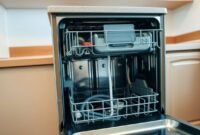Dishwashers are a common household appliance that simplifies dishwashing. However, some of their parts are neglected, like the dishwasher air gap. It’s a small device installed on the kitchen sink or counters to prevent dirty water from flowing into the dishwasher.
This article delves into the significance of the dishwasher air gap, its role in maintaining a healthy and secure kitchen, and why it’s terrible not to have one.
Is the Dishwasher Air Gap Necessary?
Absolutely. Utilizing a dishwasher air gap is critical to avoid polluted water from re-entering the dishwasher. It safeguards the kitchen environment by inhibiting cross-contamination and the backflow of contaminated water. Complying with plumbing codes in certain states and local regulations is also necessary.

When to Use an Air Gap for the Dishwasher?
A dishwasher air gap is a small tool that stops dirty water from returning to the dishwasher. It creates a boundary between the dishwasher and sinks drain, halting cross-contamination and the flow of polluted water. So, when do you need to use an air gap for your dishwasher?
It’s easy – if your plumbing code requires it, you must use an air gap. Though some areas may not demand it, it’s best to play it safe and install one anyways. Air gaps are an inexpensive fix that can prevent polluted water, legal consequences, and health issues.
Furthermore, using an air gap is essential if you have a garbage disposal. Garbage disposals can jam the sink drain, causing water to overflow into the dishwasher. The air gap blocks this by creating a barrier. Even if you don’t have a garbage disposal, you may require an air gap if your sink drain clogs frequently.
Read also: How to Remove Garbage Disposal from Sink
The Risks of Not Having A Dishwasher Air Gap
As stated earlier, having a dishwasher without air gap brings more harm than good, including health and legal issues. Here is a further explanation of the risks.
● Cross-contamination
Not having a dishwasher air gap can cause cross-contamination as dirty water may flow back into the dishwasher. This can contaminate your clean dishes with harmful substances or bacteria.
● Health Hazards
Contaminated water can harm your family’s health, especially for children and elderly members. Without an air gap, the water that flows back into the dishwasher can contain dangerous microorganisms that cause illnesses like E. coli, salmonella, and other foodborne diseases.
● Damaging Your Dishwasher
Dirty water can harm the dishwasher’s internal parts, resulting in costly repairs or replacements. Furthermore, contaminated water may cause unpleasant smells, lowering the dishwasher’s efficiency and making it less desirable.
● Fines and Legal Penalties
Not having a dishwasher air gap can lead to fines and legal penalties in some places where plumbing codes require it. Installing an air gap is necessary to avoid cross-contamination and health risks.
What States Require a Dishwasher Air Gap?
As previously noted, certain states or localities require the installation of a dishwasher air gap to maintain a hygienic and secure kitchen environment. The following states demand that citizens install a dishwasher air gap:
- Arizona
- California
- Illinois
- Indiana
- Minnesota
- North Carolina
- Ohio
- Oregon
- Texas
- Virginia
- Washington
you should note that the above list may not encompass all relevant regulations and requirements. Each can differ depending on your residential area. If you’re uncertain whether your state or locality necessitates an air gap, you can check the local building department or seek guidance from a professional plumber.
So, is the dishwasher air gap necessary? Yes. Installing a dishwasher air gap is essential for a safe and healthy kitchen. It prevents dirty water from flowing into the dishwasher and protects against contamination. It’s better to be safe and consult a professional plumber to ensure your kitchen is safe and healthy.


